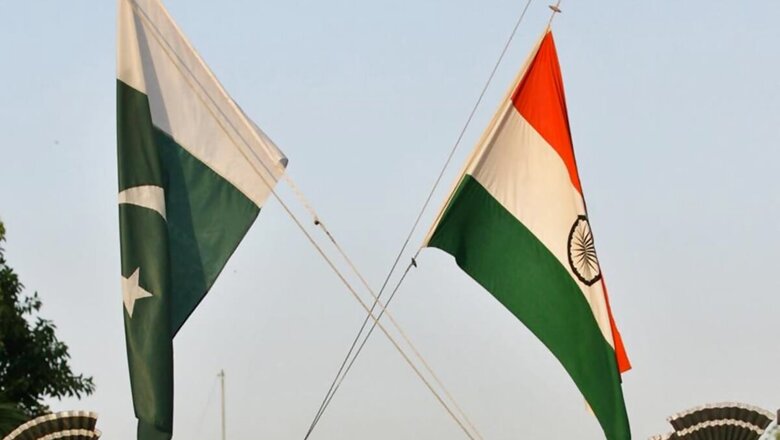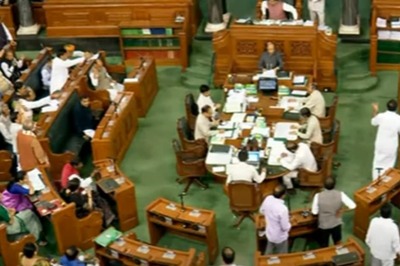
views
The latest U-turn by Pakistan’s ‘selected’ Prime Minister Imran Khan on his country’s dealing with India is quite absurd even by the absurdities and U-turns that are emblematic of the feckless governance of the ‘hybrid’ regime. A day after the Economic Coordination Committee (ECC) of the Cabinet announced that Pakistan would buy sugar and cotton from India, the cabinet made a U-turn and deferred the decision of the ECC. Subsequently, a meeting of a special cabinet subcommittee to discuss relations with India declared that there will be no trade with India until India reversed the constitutional reforms in the erstwhile state of Jammu and Kashmir.
That the cabinet led by Prime Minister Imran Khan rejected the summary that he had himself approved as commerce minister, made the government into a laughing stock online. But the comic relief provided by Imran Khan’s frequent U-turns has pushed into the background some very serious questions about what could be happening inside the power corridors of Islamabad. Equally, what does it mean for the fledgling ‘peace process’ that is being carefully choreographed on the back-channel, reportedly operating between the Indian civilian establishment and Pakistan’s military establishment.
The comic relief provided by Imran Khan’s frequent U-turns has pushed into the background some very serious questions about what could be happening inside the power corridors of Islamabad.
According to reports, when the proposal came up before the ECC, it was endorsed by all the ministers because Imran Khan wearing the hat of commerce minister had approved it. Among those who endorsed it were people like Planning Minister Asad Umar, who later on opposed the proposal when it came up before the cabinet. Opposition also came from the interior minister, the human rights minister and the foreign minister. It has also been reported that the foreign minister and the Pakistan foreign office was kept out of the loop and they objected quite vehemently in the cabinet meeting and the later ministerial meeting that was summoned by the government.
Given this background, a plausible case can be made that the entire affair was nothing more than a communication and coordination foul-up — right hand of government not knowing what the left hand was doing. It is also possible that Imran Khan wearing the hat of commerce minister did not apply his mind when he gave his nod to the proposal to buy sugar and cotton from India. He later realised the error made, and reversed the decision. The only problem is that no one is buying into these disingenuous explanations. Pakistan government mouthpieces have tried to play down the fiasco and explain it away as a snafu. Imran’s advisor on national security Moeed Yusuf even tried to brazen it out by justifying the schizophrenic decision making of his boss. But the fact of the matter is that when it comes to anything to do with India, there is nothing routine in Pakistan. It strains credulity that a decision to buy commodities from India desperately required by Pakistan was taken by the ECC without bothering about the diplomatic and political repercussions of such a move.
The fact of the matter is that when it comes to anything to do with India, there is nothing routine in Pakistan.
There is as yet nothing in the public domain to suggest that the military leadership intervened and forced the government to back down on opening limited trade with India. Perhaps that is because the entire back-channel is not an initiative of the civilian government but that of the military. Also, given the focus on geo-economics in Pakistan army chief Gen Qamar Bajwa’s speech at the Islamabad Security Dialogue, it is quite possible that the army, or at least Bajwa’s cabal within the military, was open to, and even pushed for opening up some trade with India. Without such a prod, even push, it is inconceivable that the Imran regime would on its own agree to such an initiative with India.
The thing is that if the general and his cabal had indeed given their nod, then it is even more inconceivable that lackeys of the army like Shah Mahmood Qureshi or Sheikh Rashid or even Asad Umar would have gone against the military in the cabinet meeting. The fact that they did could only be for two reasons: one, some very powerful section within the army was against the opening of trade and put them up to it; two, Imran Khan and perhaps even Gen Bajwa got cold feet after the rather severe reaction from not just the opposition parties but also some of the hybrid regimes cronies and camp followers in the media. In other words, Imran’s own strident stand against India and abusive language against his Indian counterpart had come back to haunt him.
The cabinet’s refusal to endorse the trade move is a clear rebuff to Bajwa. It has an element of both defiance and political self-preservation on the part of Imran.
There are broadly three inter-related dimensions from which Imran’s latest diplomatic howler needs to be studied. The first is the domestic political implications, including civil-military and intra-military dynamics that could be at play; the second is the impact this has on the international players who are reported to be involved in trying to bring the two countries on to the dialogue table; and the third is of course the impact this will have on the back channel between India and Pakistan.
On the domestic front, if both Bajwa and Imran were on the same page on India, then it means that they were both forced to retreat in face of the adverse reaction to their outreach out to India. If, however, Bajwa was taking the lead on India and Imran was being led by his nose, then it means that the much vaunted ‘one page’ either doesn’t exist anymore or is in a tattered state. The cabinet’s refusal to endorse the trade move is a clear rebuff to Bajwa. It has an element of both defiance and political self-preservation on the part of Imran. Simply put, Imran doesn’t want to end up as the fall guy. After all, it is him and not Bajwa who will have to pay a huge political price for going back on his stance against India. In the 24 hours between the ECC announcement and the cabinet’s decision, all the brickbats were aimed at Imran and not the general or the army. With Imran’s popularity having plummeted, any softening on India would only worsen things for him politically.
Every time the military tries to get into some understanding or accommodation with the opposition parties, Imran sabotages it by arresting opposition leaders or doing something else to scuttle things.
Shafting Bajwa is not at all bad politics from Imran’s point of view. For one, he can burnish his hyper-nationalist and Islamist credentials and present himself as someone who stood up for Pakistan’s ‘beloved Kashmir cause’ and didn’t sell Kashmir’s Muslims for some measly benefits that would accrue from trade with arch-enemy India. For another, he can showcase himself as someone who isn’t a puppet who dances on the tune of the generals. But most importantly, by going against Bajwa, he thinks he has bought some insurance for himself. At one level, if any attempt is made to sack him or destabilise his government, he can pretend it was done because he stood up to the army and for the cause of Kashmir. At another level, he has played the army on India in the same way he has been playing the army against his political opposition. Every time the military tries to get into some understanding or accommodation with the opposition parties, Imran sabotages it by arresting opposition leaders or doing something else to scuttle things. He could now be attempting to do something similar on India, only this time he is trying to exploit the differences within the army on how to deal with India.
At the international level, the trade fiasco isn’t really going to do any credit to either the civilian regime or the military establishment in Pakistan. There have been all sorts of reports about the various international players who have been trying to get India and Pakistan to talk to each other. Apart from the ubiquitous, and somewhat mythical, US ‘pressure,’ there are reports of the UAE brokering talks, and of the Saudis playing a role to reduce tensions between India and Pakistan. Some Pakistanis have even spoken about Russia and China using their influence to get the two sides to talk to each other. While most of the reports are far-fetched, even exaggerated, the important thing is that whatever marginal role was played by whichever country, that country would be feeling let down with the way things have turned out. Its credibility in being able to play honest broker, put things together and take things forward by using its influence on Pakistan is now in tatters. This isn’t a bad thing for India which can always use this embarrassing episode in Pakistan to her advantage the next time someone offers their good offices to mediate or broker talks. What is more, India has come out looking good — a reasonable country willing to engage with Pakistan for stable relations and peace in the region, with a government that is ready to risk political capital and engage a hostile Pakistan.
This snake oil has been successfully sold to successive Indian leaders over the years — Shimla agreement, Sharm-el-Sheikh, the Musharraf formula.
But it is the third dimension — impact on the back channel talks — that is most critical from India’s point of view. The episode has left the army brass in Rawalpindi red-faced and shown them up for not being able to deliver even on baby steps. At the same time it has left India in a quandary over who to talk to in Pakistan. India has always preferred to talk to civilians but they have always failed to deliver. This time India was talking to the military, but it seems even it is hamstrung and cannot deliver. If earlier the army would sabotage things, this time the civilians have done so.
India will also need to guard against the possibility that the entire episode could be used by the Pakistanis to impress upon India to cut them some slack that otherwise India would be reluctant to do. The Pakistan Army could wave the cabinet’s rejection of the trade opening to claim that their hands are tied. In order to move things along they will ask India to do something that can then be sold to the civilian government and get it back on board. Already hints have been sent through friendly journalists in India about concessions on Jammu and Kashmir that will help break the logjam. This is standard Pakistani playbook. They create or use a crisis or obstacle to get something which is not on offer. The idea is to convince the other side that a seemingly small but actually significant concession will keep the ball in play which will benefit it tremendously.
This snake oil has been successfully sold to successive Indian leaders over the years — Shimla agreement, Sharm-el-Sheikh, the Musharraf formula. It was also tried in Agra in 2001, but at the last moment the Vajpayee government didn’t bite the bait. It remains to be seen whether the Modi government gets taken in by the sob stories that are going to be told on the back-channel and bites the bait, or it sticks to its guns and refuses to do so.
This article was first published in ORF.
Read all the Latest News, Breaking News and Coronavirus News here. Follow us on Facebook, Twitter and Telegram.
















Comments
0 comment